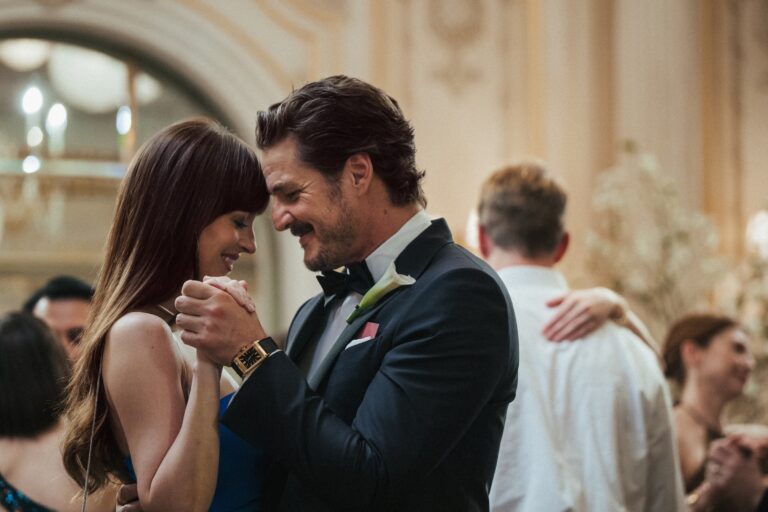Materialists (2025 | USA | 117 minutes | Celine Song)
Fresh off the enormous success of Past Lives, Celine Song returns to the world of divided affections in Manhattan. Her first semi-autobiographical film concerned yearning across decades and missed connections across continents. It was among my favorite movies of 2023 , an Oscar nominee, and Seattle Film Critics Society’s Best Picture of the Year. Materialists, which finds her returning as both writer and director, is also loosely inspired by her own past life, bringing a more cynical eye to the complexity of beautiful people seeking soulmates on the comfortable side of the precipitous economic divide.
The synopsis — “A young, ambitious New York City matchmaker finds herself torn between the perfect match and her imperfect ex.” — isn’t exactly correct, but I can see why A24 is trying to sell it that way. That description sets up the expectation of a frothy rom-com. Even though it goes through it hits all the conventional marks and is shot in shimmery soft focus Past Lives cinematographer Shabier Kirchner, it really doesn’t play like one at all. Instead, there’s a persistent and uncomfortable frisson across the film’s extended uncanny valley, suggesting cunning subversion or an abject failure on every level. My expectations were high, but I wonder how the film’s odd series of promotions will prime audiences to receive it.
I suppose we’re so enmeshed in convention that it’s easy to ignore the film’s actual sensibilities, which are neatly summarized by the bookending dialogue-free fable that opens (and closes) the film. Imagining the first ancient people to get married, Song shows us her view of romance. An unnamed He arrives concludes a long journey to a cave with a bouquet of flowers for the recipient; She, however, is far more invested in the quality of the hand-carved knives in his satchel before allowing the relationship to proceed.
In the present day, we meet an easily glamorous Lucy (Dakota Johnson). Like Celine Song once did, she works at a high-end matchmaking company in Manhattan, handing out cards to handsome strangers in the park and harvesting lists of non-negotiables from her wealthy clients. They’re filmed directly to camera, unguardedly gushing about dates or detailing their stringent requirements for the soulmates they’re paying to acquire. Their fussy, unrealistic specificities provide plenty of laughs as we watch Lucy negotiate their expectations, let them down easily from rejections, all without bruising their delicate oversized egos.
Back at her firm, colleagues bombard her with balloons, champagne, and cake upon hearing that another year of her clients has gotten engaged. This will be her ninth marriage, marking her as something of a legend. To me, that number seemed low for an apparently international service that supports dozens of full-time matchmakers for clients who pay thousands of dollars per month. The staff may dress to the nines, but the employees are only taking home five figures.
A benefit of landing a client with a partner is getting invited to the wedding to watch them seal the deal. After walking a panicked bride back from the ledge of calling the whole thing off, a reception full of wealthy guests inspired by proximity to true love is an ideal setting for recruiting new clients. That’s exactly what Lucy does, first in the coolly assured economic terms of value to the would-be runaway bride, then in the gauzy sales pitch that makes the actuarial task of finding “grave-buddies” sound like the most romantic ambition in the whole world.
It’s at this wedding, sitting at the “singles table,” that Harry (Pedro Pascal) swoops in. The single brother of the groom — equally tall, rich, and from a family who loves love — he’d be a “unicorn” client, if only he wasn’t interested in wooing her. Their conversation is interrupted when one of the caterers already bearing Lucy’s very odd signature combination of a beer and coke (please, we absolutely cannot make this happen) turns out to be Lucy’s ex-boyfriend (Chris Evans). He’s scruffy but cleaned up, an aspiring actor who’s pushing 40, still drives an old car, and shares a cramped low-rent apartment with roommates. A flashback shows us how their five-year relationship exploded, but years later, despite being infrequently in touch, they still call each other “buddy” and have an easy smoke-break rapport.
While a conventional movie might set up the men as romantic rivals, Evans basically disappears from the first half of the movie to remove any potential obstacle from Harry’s easy pursuit of Lucy. Despite being a voluntarily celibate woman who’s sworn off dating (resolving that she’ll have to marry the next man she dates, provided he’s extremely wealthy), Lucy reluctantly agrees to go out with Harry if only to convince him he’d be better off with her as a matchmaker than as a wife. As a handsome, six-foot-tall man in private equity with great taste in restaurants, studied ease in picking up both checks and giant bouquets, and a $12M penthouse with a satin-sheeted bed, he does, however, definitely check that one essential box.
It should be a fun setup, but every scene falls flatter than the next. The major problem (or innovation) is that like the old cliché about men being from Mars and women being from Venus begins to feel true in that no one in the entire film appears to be from Earth. The discordance is so extreme that I wondered whether this was intentionally shaping up to be a complete failure of a romantic drama in order to function as an exceptionally subversive takedown of the whole genre.
At no point does it seem like Lucy and Harry are falling in love, let alone capable of experiencing a human emotion. They’re moved around glossy settings — his stunning penthouse, a series of elite restaurants — like beautiful chess pieces on a board owned by someone who never learned the rules and only bought the set because it would look good in the background of photos. Pascal, Johnson, and Evans more than fulfill the promise of being able to watch beautiful people for a couple of hours, but all of them do their best acting when they’re not speaking.
The preview screening erupted in titters of glee from men and women alike when Pedro first appears on screen, which forces me to acknowledge that I am seemingly among the very few people on Earth immune from perceiving him as a remotely credible romantic lead. But the problems of the movie aren’t his alone. As much as I’ve liked both he and Dakota Johnson in other projects and found them immensely charming in interviews, they’re icily uncharismatic here, be it together or apart, often tasked with communicating in clever monologues of sharp ideas that are better on the page than in the flesh. Whenever they speak to each other, it feels like aliens approximating patterns of human speech without having learned the vocabulary. Johnson’s monologues pitch matchmaking in the mathematical terminology. Trenchant observations for sure, and the frank acknowledgment of the role of wealth in the ease of finding happiness and how disparities can fracture relationships are very welcome. But they too often sound like the mathematical musings of someone who’s got off the STEM train before trigonometry, but who watched enough Industry to blather about investment and value propositions. Maybe the point is that this is all bluster, a defensive facade that not even she believes. Regardless, it never lands. The two share exactly one effective scene that hilariously pays off an early set-up; the facade breaks and they’re allowed to be funny. It makes you wish that the movie had been allowed to be looser and less glossy.
As their relationship fractures, the film clumsily re-orients itself to interrogate the credibility of Lucy’s principles. While her adventures in the world of matchmaking provide occasional comedic relief, they also are the conduit for a disastrously ill-fitting tertiary plot. Featuring the ill-fated dating life of a lonely doctor (Zoë Winters, with some of the same suppressed manic longing from Succession), the issues raised by her experiences with the service and the men she meets through it are highly relevant. But the increasingly dark turns aren’t at all served by the way they’re squeezed into this narrative, primarily as a turning point for someone else.
A series of contrivances — largely the unsettling reality that no one in this movie has a single friend in New York City — do, of course, bring Chris Evans back into the frame. But rather than a welcome reprieve from the chilly charismatic void, his emergence ushers in a different kind of uncomfortable imbalance. There’s a hasty road trip, a crashed wedding, and even more monologues. Celine Song remains a master at depicting city sidewalk yearning and capturing the romantic possibilities of twinkly incandescence in rural settings, but the charmed look of the filmmaking remains ever undercut by the script and what the actors fail to bring to it.
Again and again, I kept questioning whether casting gorgeous actors with negative chemistry was a galaxy-brained subversive choice that was sneakily effective. After all, introducing nagging uncertainty by way of obvious mismatches could have been a brave decision. As the film dragged on through its uneven paces, I soon found myself so checked out that I started asking meta-filmmaking questions like: Is a beautiful woman being filmed in unflattering candlelight to undermine audience confidence in her monologues and appraisals of value? Is a handsome actor being lit to look like there’s an AI filter to exaggerate his attractiveness a way of making us question whether he could possibly be real?
Every time I find myself on the precipice of convincing myself that there’s actually something very interesting going on with the discomforts of this unconventionally conventional love story, I step back from the cliff and remember to embrace the film’s central thesis: dating may be hard, but love is the easiest thing. As much as The Materialists checks a lot of boxes, I found it incredibly difficult to make the leap to love it.
The Materialists arrives in theaters on June 12th.
Image courtesy of A24.




